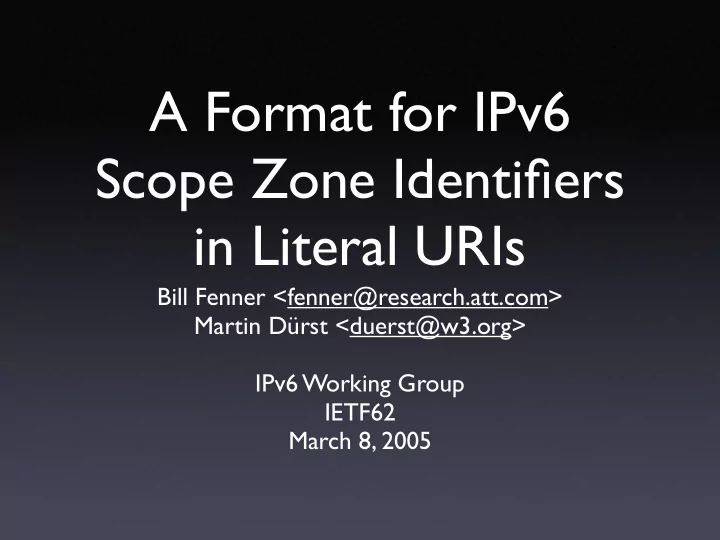

A Format for IPv6 Scope Zone Identifiers in Literal URIs Bill Fenner <fenner@research.att.com> Martin Dürst <duerst@w3.org> IPv6 Working Group IETF62 March 8, 2005
What’s the Problem? • : in v6 literals conflict with : to separate address from port in URLs • RFC 2732, “Format for Literal IPv6 Addresses in URL's” revises RFC 2396 to add the [2001:db8::cafe:f00d] form • Incorporated into RFC 3986, “Uniform Resource Identifier (URI): Generic Syntax”, now full Standard.
Isn’t that enough? • What about reaching [fe80::cafe:f00d] from a system attached to multiple links? • (note that loopback counts as a link on some implementations)
Didn’t we decide not to solve this problem? draft-ietf-ipv6-scoping-arch-02: Hence, this document does not specify how the format for non-global addresses should be combined with the preferred format for literal IPv6 addresses. As for the conflict issue with the URI format, it would be better to wait until the relationship between the preferred format and the URI syntax is clarified. In fact, the preferred format for IPv6 literal addresses itself has the same kind of conflict. In any case, it is recommended to use an FQDN instead of a literal IPv6 address in a URL, whenever an FQDN is available.
What’s RFC 3986 say? • IP-literal = "[" ( IPv6address / IPvFuture ) "]" • IPvFuture = "v" 1*HEXDIG "." 1*( unreserved / sub-delims / ":" ) • unreserved = ALPHA / DIGIT / "-" / "." / "_" / "~" • sub-delims = "!" / "$" / "&" / "'" / "(" / ")" / "*" / "+" / "," / ";" / "=" • Regular expression: [v[0-9A-Fa-f]+.[-0-9A-Za-z._~!$&'()*+,;=:]+]
What’s the I-D suggest? • [v6.fe80::cafe:f00d_de0] • Fits URI grammar; doesn’t fit scope zone spec • [v6.fe80::cafe:f00d%25de0] • Ugly; pct-encoded not allowed in grammar • [v6.fe80::cafe:f00d%de0] • Ambiguous - is that pct-encoded 0xde? • Percents are too special in URI parsers • Bare percent not allowed in grammar
Question #1 • Should we proceed using ‘_’ (or some other non-percent character?) • Fits existing grammar • Can’t copy and paste from existing uses of ‘%’ • If so, should this update the IPv6 Scoped Address Architecture document?
Question #2 • If not, should we proceed using ‘%25’? • Doesn’t fit existing grammar - would require URI spec update • Can’t copy and paste from existing uses of ‘%’
Question #3 • If not, should we proceed using ‘%’? • Doesn’t fit existing grammar - would require URI spec update • Exception to fundamental URI rule
Questions • Should we proceed using ‘_’ (or some other non-percent character)? • How should this update draft-ietf-ipv6- scoping-arch? (Both ‘_’ and ‘%’? Not at all?) • If not, should we proceed using ‘%25’? (Requires URI spec update; argued against by URI experts) • If not, should we proceed using ‘%’? (Requires URI spec update; argued against even more strongly by URI experts)
Backup Slides
Characters Available - . _ ~ ! $ & ' ( ) * + , ; =
Why not use %25? • It’s not ‘%’, so would require conversion between scoping-arch and URI format • (so why not use something else that requires conversion between scoping-arch and URI format?) • It’s not allowed in a literal address in the URI grammar
Why not use %? • ‘%’ is very special in URIs; it has a whole section dedicated to it in RFC 3986 • It’s not allowed in a literal address in the URI grammar • The URI community has pushed back very hard against any use of ‘%’ that is not percent-encoding
Recommend
More recommend